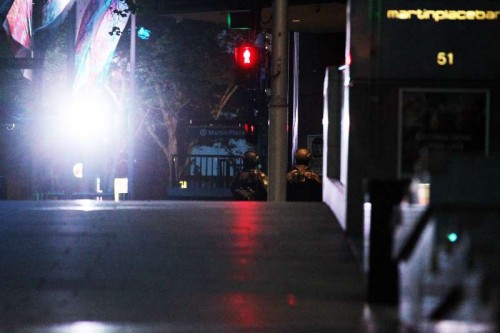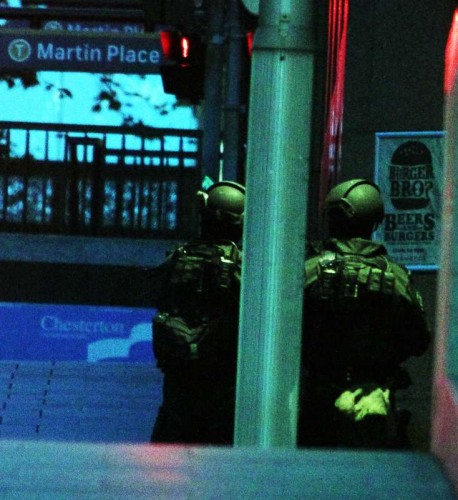
A 16-hour hostage crisis — the first terror attack in Australia — ended early Tuesday after police stormed a cafe in the heart of Sydney where an Iran-born cleric took some 30 people hostage and made several demands, sending shockwaves across the country.
As police stormed Lindt Chocolate Cafe using flash grenades and firing dozens of gunshots, several hostages — panic writ large on their faces — fled with their hands raised past advancing heavily armed policemen.
One of them was Ankireddy Vishwakant, an employee of software major Infosys who hailed from Guntur in Andhra Pradesh and was recently granted Australian citizenship.
“Thank God! This is a big relief for us,” said Ankireddy’s father Ishwar Reddy at his house in Guntur town, about 300 km from Hyderabad.
Media reports identified the second Indian as Pushpendu Ghosh.
The Australian media said two people may have been killed in the police operation, and one of them could be the hostage taker, Man Haron Monis, a 50-year-old who had been granted asylum in Australia in 1996.
TV clips showed him as a bearded man with a white headgear who had been previously charged with sexually attacking seven women and trying to kill his former wife.
An unspecified number of people were also wounded Monday. Several people were taken away on stretchers.
“Yes, yes, he has escaped. It is good news,” an elated Deputy Consul General in Sydney Vinod Bahade said over the telephone, referring to Vishwakant. “Yes, it is over,” he said of the hostage crisis.
The Indian government confirmed that two Indians had been held hostage and both had survived the ordeal.
The police operation followed several hours of tense suspense when Australians remained glued to televisions, and the Indian community in all Australian cities prayed for the safe release of the hostages.
Police had told Vishwakant’s wife in Sydney that they hoped to end the hostage crisis – which happened just before Christmas – within a day. They kept their word.
The dramatic police operation began suddenly around 2.30 a.m., with three bangs followed by dozens of gunfire shots.
Within minutes, several hostages were carried away on stretchers by police personnel and para-medics.
Police officers then told the Sydney Morning Herald that the siege was over.
The chilling incident took place in Sydney’s central business district and barely 400 meters from the Indian Consulate, which was promptly evacuated.
Also located in the vicinity are the offices of India Tourism, State Bank of India, Bank of Baroda and New India Insurance.
Indian Prime Minister Narendra Modi – who was in Sydney in November – was among the first to condemn the attack.
“Such acts are inhuman and deeply unfortunate. I pray for everyone’s safety.”

Modi’s Australian counterpart Tony Abbott appealed for calm.
The anxious hostages were earlier seen standing with their hands raised at the expansive French windows of Lindt Chocolate Cafe at Martin Place.
A black and white apparently jihadi flag was held up in one window.
Indian diplomat Bahade said that soon after the hostage crisis began, the Indian consulate was evacuated.
“We have not shut it. Work will resume once the problem is solved.”
Five hostages fled in the early part of the saga, and their desperate dash to freedom was caught live on camera.
The armed man demanded an Islamic State (IS) flag and said he wanted to talk to Prime Minister Abbott. Possession of the IS flag is illegal in Australia.
Like Australians, Indians in Sydney were a worried lot, an Indian businessman there said.
Sri Shanmugam, 56, said in a telephonic interview that fewer Australians were on the streets in Sydney, and there had been a noticeable fall in the customers who usually throng his two restaurants.
“We are all shocked. We are praying that this has a peaceful resolution,” he said, referring to the concerns of the 350,000-strong Indian community in Sydney where he has lived since 1991.
The hostage taker claimed he had planted bombs in the cafe and elsewhere in the city.
The three men and two women who escaped from the cafe said the man forced his captives to call him “brother”.
Nearby streets were cordoned off. Train services were shut down nearby.
Police also evacuated the nearby Sydney Opera House and shut down traffic on the Sydney Harbour Bridge.